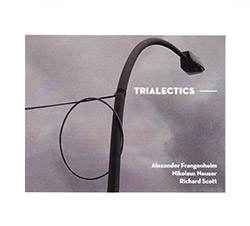
Active and exciting electroacoustic improvisation with a strong emphasis on the electronics from Richard Scott and his uniquely developed modular synthesizer, from this Berlin-based collective trio with double bassist Alexander Frangenheim and trumpeter Nikolaus Neuser, exploring Trialectics, a complex system of 21st century thought and formal logic.
Out of Stock
Quantity in Basket: None
Log In to use our Wish List
Shipping Weight: 3.00 units
Sample The Album:
Alexander Frangenheim-doublebass
Nikolaus Neuser-trumpet
Richard Scott-modular synthesizer
Click an artist name above to see in-stock items for that artist.
UPC: 5609063404609
Label: Creative Sources
Catalog ID: cs460
Squidco Product Code: 24754
Format: CD
Condition: New
Released: 2017
Country: Portugal
Packaging: Cardboard Gatefold
Recorded at Studio Borne 45, in Berlin, Germany, on January 12th, 2016, by Alexander Frangenheim
"Trialectics documents Frangenheim in a lively & abstract trio with Richard Scott on synth & (the previously unknown to me, but appearing on e.g. the Mingus tribute album I Am Three released on Leo Records last year) Nikolaus Neuser (b.1972) on trumpet. Scott is of course familiar from Natura venomous - an album with a similar mood & density - & elsewhere. Indeed, despite the very different instrumentation, there is clear continuity in the style of interaction that Scott brings to both albums, although the etude-like character of the nine short tracks on Trialectics (all longer than three minutes & shorter than six minutes) might suggest a more direct comparison with Underwater Music & its nine tracks. However, Trialectics employs a broken consort, to use the old terminology, rather than three string instruments, and so revels in a differentiated pallet of timbres that can be exploited in different combinations. (One might also compare to another recent trumpet trio with bowed string & electronics, Autres Paysages, generally a rather more tonal & less extended album, as discussed here earlier this week: Despite the differences, it's fascinating how parallels present themselves around the same time.)
I found Trialectics to be immediately captivating, particularly for the dense three-way counterpoint that begins immediately, and which is further articulated in various combinations throughout the album. I'm not particularly familiar with the concept of "Trialectics" per se, which was apparently coined by Henri Lefebvre to figure (specifically) spatial concerns beyond the real & imagined - what might be called the "virtual" today. (There is an architectural, and so quite possibly familiar to these performers, refinement of this notion by Edward Soja to suggest a third sort of space that is both real & imagined. There are also theoretical connections to postcolonial hybridity, although I don't hear that aspect here.) In other words, it's an attempt to move beyond both dualism & the straightjacket of formal dialectic resolution (although it seems to echo more than escape the latter, given the sense of motion toward a third-term). In any case, philosophical (or phenomenological) terminology aside, there is a clear attempt to forge something both more than the sum of its (three, so perhaps that's the simplest way to receive the title) parts & fully integrated as such: There is thus no sense of collage, and stylistic influences are basically atomized in order to be reconfigured from the ground of the three-way interaction.
In this, likewise as recently noted, there is less emphasis on quiet, particularly from Frangenheim, and indeed, Trialectics has sufficient presence that I was able to enjoy it while my driveway was being repaved. (I like to see how different music will function in "extreme" sonic environments.) This surprised me, due to the delicacy involved, but the interplay of high registers is particularly rich here, not so much continuous (or glissando) high pitches, but various beeps, blips & bloops that add percussive strikes & rhythmic sharpness to the high-end contours. Electronics are prominent in this interplay, which often has a sparkling or burbling quality, including chiming tones & whistles, but so is trumpet, and even bass via harmonics. The latter also emphasizes a low end growl sometimes (albeit not so audibly during paving), and generally retains a strong presence too. That said, Trialectics is not an album of extremes, even if the highs do tend to reinflect the counterpoint in various ways (including so as to differentiate the sound from e.g. spectral music, which otherwise influences so many recent Creative Sources releases). Moreover, not only might midrange timbres develop an independent twang, but e.g. radio calls are evoked, suggesting an (attenuated, at least) sense of (outer) space: Yet, it comes off as an electronic earthiness somehow.
Perhaps this is where the Trialectics concept per se comes into play, although I don't know that there was intent to articulate it in any technical detail. (Natura venomous had already explored an "earthy" setting in part via fanciful electronics, so that comparison returns here.) Such electronic earthiness, so to speak, might further be invoked, and quite starkly at that, by the figure of the old streetlamp on the cover. The result then presents not only a fresh variety of timbral combinations, but a potent sense of integration that continues to be consistently enjoyable & thought provoking. Finally, for those readers concerned specifically with the affective qualities (and I've already reframed the question with that terminology), it's not that an album such as Trialectics conveys a particular emotion, or even a particular sequence of emotions, but rather that it refigures (pre-emotional) affect according to new relations: Emotional responses open onto spaces beyond modern subjectivity, and in that shift, it's actually description (or conceptualization) that falters prior to feeling per se. Perhaps one question raised in turn is what the listener can continue to feel absent such a (conceptual) safety net (i.e. familiarity): Just how are one's affects configured & how are they traced (differently) by the unfamiliar?"-Todd McComb, Jazz Thoughts
Get additional information at Todd McComb's Jazz Thoughts
Artist Biographies
• Show Bio for Alexander Frangenheim "Born in Wuppertal, he studied sculpture at the academy of fine arts in Stuttgart and at the same time classical Doublebass with Reinald Schwarz, soloist of Stuttgart Philharmonics. Having encountered experimental music in his youth, beside classical playing he soon ventured into free improvisation as well as working with graphic notations in the ensemble of composer Klaus Fessmann, who holds a professorship at Salzburg Mozarteum. After having met Günter Christmann in the early 90s, who became a close friend over the years, a grant offered the possibility to go to London, where he finally was able to explode into a most intense period of sessions, collaborations, concerts and recording sessions, this all with help by John Russell, Chris Burn and John Butcher. Back in Stuttgart he was asked to teach experimental music at the academy of fine arts Stuttgart, which he did for a period of ten years and which led him to extended sound and performance explorations in collaboration with his students. He continued to organize the festival concepts of doing - Interaktion Tanz Musik (1992 - 2003) and, after an intense trip through many european countries meeting dancers for free improvisations and an invitation to the 5th Composers Choreographers Exchange (Southbank Center London), he was co-founding the production center for dance and performance Stuttgart. Being the head of this association for three years and after the festival of concepts of doing 2003, he pushed these structures aside for regaining breath and new freedom and inner engagement in life and arts. At the same time this moment was accompanied by his last days in ensemble zeitkratzer, which he was member of since its beginning in 1997 (performances of famous MMM by and with Lou Reed as well as music by alva noto, Merzbow, Lee Ronaldo, Elliott Sharp, DJ's a.o.). 2005 saw him establishing himself in a space in Berlin to seek new projects. Since then he has recorded three cds, created the music for the experimental film "Lupinen löschen" by Sabine Schöbel, which was shown at the Berlinale 2007, and started to work with analog electronics on the acoustic double bass as well as on an electric one, introducing this to his collaborations with dance. He played in groups... trio with Jim Denley and Steve Noble; duo with Phil Durrant (cd); quintet with Evan Parker, Phil Wachsman, Thomas Lehn, Roger Turner; duo with Günter Christmann (cd); "Ein Quartett" with Bieler-Wendt, Kolkowski, Zimmerlin; trio with Chris Burn and Axel Dörner. Projects with Günter Christmann: Sextett Vario 34 (cd) und "con moto" (music, dance, sound poetry, film) with David Zambrano, Urs Leimgruber, Fine Kwiatkofski, Elke Schipper (dvd). Concerts with... Paul Lovens, John Butcher, Phil Minton, Derek Bailey, Sven-Ake Johannson, David Moss, John Russell, Johannes Bauer, LeQuan Ninh, Dietmar Diesner, LaDonna Smith, Malcolm Goldstein, Fred Frith, Vinko Globokar, Barry Guy, Torsten Müller, Carlos Zingaro, Fred van Hove, Urs Leimgruber, Mats Gustafsson, Dorothea Schürch, Herb Robertson, Alberto Braida, Michael Griener, Yumiko Tanaka a.o. Intense work with dancers in diverse performing and rehearsing situations. Collaborations with Julyen Hamilton, Vera Mantero, Benoit Lachambre, Ingo Reulecke, Josè Luis Sultàn, Mark Tompkins, Junko Wada, Fine Kwiatkofski, Regina Baumgart, David Zambrano, Sasha Waltz, Katie Duck, Joachim Schlömer, Thomas McManus, Nigel Charnock, Xavier Le Roy, Frans Poelstra, Virpi Pakhinen, Russell Maliphant, Anzu Furukawa, Pal Frenak, Anna Huber, Andreas Müller, Astrid Endruweit, Jennifer Lacey, Lin Yuang Shang. concepts of doing. Between 1992 and 2003 he organized the festival "concepts of doing - Interaktion Tanz Musik" which became an important european plattform for the exchange of the arts inviting many notable artists for free collaborations during 4 days. (Please see: www.concepts-of-doing.de). cd: "screen. Festival concepts of doing 1999" mit Yoshihide, Turner, Leimgruber, Schürch, Parkins, Newton, Frangenheim. Critics: "mikrotonale Edelsteine" (Markus Müller, Jazzthetik), "deliciously subversive" (Cadence), "music straight from the dynamo" (The Wire), "Frangenheim uses extended string techniques Gidon Cremer supplied for Luigi Nono" (The Wire). Lives in Berlin since 2005. In preparation for creative space for 2009, which will allow him to continue his work with dance and other media. Projects: trio with Chris Burn and Axel Dörner; quartet with Thomas Lehn, Le Quan Ninh, Frederic Blondy; duo with Günter Christmann /as well as other formations; trio with Floros Floridis and Ray Kaczynski; cds in prep: quartet with Moss/Bauer/Tanaka, quartet with Turner/Wachsman/Pat Thomas. performance project "streugut" together with Clausen, Reulecke, Rudstrom, Simon." ^ Hide Bio for Alexander Frangenheim • Show Bio for Nikolaus Neuser "Nikolaus Neuser (* 1972 in Siegen ) is a German jazzmusician ( trumpet, wing horn ). Neuser studied from 1994 to 1998 at the Folkwang-Hochschule in Essen with Uli Beckerhoff. In 1999, he moved to Berlin, where he performed with the Hannes Zerbe Jazz Orchestra ( Eisleriana and Erlkönig ), the Berlin Jazz Orchestra, Pinx, the Potsdama Lotsa formation (with Gerhard Gschlößl, Patrick Braun, Silke Eberhard ), the Satoko Fujii Orchestra Berlin ( Ichigo Ichie, 2015) and works with The Alliteration. He also heads the Nikolaus Neuser, to whom Bernd Oezsevim, Gerhard Gschlößl, Johannes Fink and Silke Eberhard belong. In 2015 he presented the album Pink Elephant (Jazzwerkstatt). Since 2012 he belongs to the Fun Horns (with Volker Schlott, Falk Breitkreuz, Jörg Huke ). Cooperations with the German Foreign Office, the Goethe Institute and the DAAD enabled him to stay and tour in China, Thailand, Vietnam, North Africa, Lebanon, the USA, Saudi Arabia, Europe and Colombia 2007 at the Pontificia Universidad Javeriana de Bogotá. [8th] In the area of pop music he is on albums of || Seeed, Peter Fox, Miss Platnum, 4hero, Pohlmann || Among others. He also worked with the Sonar Collective Orchestra and in the 2000s in the electronic jazz project Trondheym." ^ Hide Bio for Nikolaus Neuser • Show Bio for Richard Scott "Dr. Richard Scott is a UK-born Berlin-based composer and free improvising musician working with analogue modular synthesizers and alternative controllers such as his own self-designed WiGi infra red controller developed at STEIM, the Buchla Thunder and Buchla Lightning. He has been composing and performing improvised music for over 25 years, recently performing and recording with artists such as Evan Parker, Shelley Hirsch, Sidsel Endreson, Twinkle³, Richard Barrett, Axel Doerner, Jon Rose, Clive Bell, Kazuhisa Uchihashi, Emilio Gordoa, Thomas Lehn, Frank Gratkowski, Michael Vorfeld, Ute Wassermann, Phil Marks, David Birchall, David Ross, Bark! and Grutronic amongst many others. He studied improvisation with John Stevens, saxophone with Elton Dean and Steve Lacy, Action Theater improvisation with Sten Rudstrom and electroacoustic composition with David Berezan and Ricardo Climent. His work has been featured on BBC Radio 3 and 4, International Computer Music Conference (Athens and Huddersfield) London Jazz Festival, BEAM, Bratislava NEXT Festival of Advanced Music, Konfrontationen, Austria, SARC Sonorities Belfast, International Festival for Artistic Innovation, Leeds, Berlin Interaktion Improvised Music Festival and MANTIS Electroacoustic Music Festival, Manchester. He was a long term artistic resident at STEIM in Amsterdam, sometimes a Lecturer and visiting professor at various Universities and co-curator of two important long-running "underground" concert series in Berlin: AUXXX Berlin and Basic Electricity. In 1993 he was awarded a PhD from London University for his thesis on free improvisation. In 2010 he completed a MusM (distinction) in Electroacoustic Music Composition at NOVARS, Manchester University. He wrote extensively for Wire magazine, was administrator at the LMC (London Musician's Collective) and has been an active member of the improvising and electroacoustic communities in London, Manchester and Berlin." ^ Hide Bio for Richard Scott
11/20/2024
Have a better biography or biography source? Please Contact Us so that we can update this biography.
11/20/2024
Have a better biography or biography source? Please Contact Us so that we can update this biography.
11/20/2024
Have a better biography or biography source? Please Contact Us so that we can update this biography.
Track Listing:
1. n 3:41
2. tw 5:48
3. thr 5:10
4. fr 4:34
5. fv 3:22
6. sx 4:17
7. svn 3:48
8. ght 4:35
9. nn 4:34
Creative Sources
Improvised Music
Free Improvisation
Electro-Acoustic
Electro-Acoustic Improv
European Improvisation, Composition and Experimental Forms
Trio Recordings
Staff Picks & Recommended Items
Search for other titles on the label:
Creative Sources.


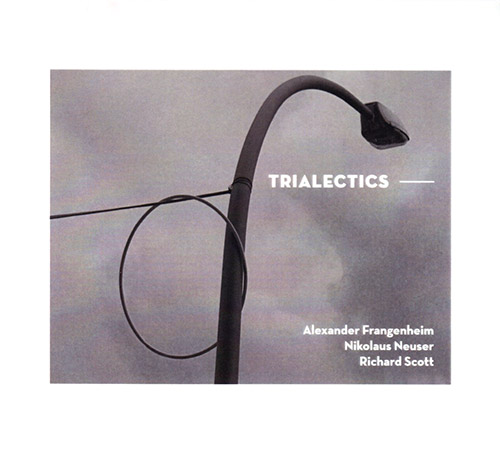
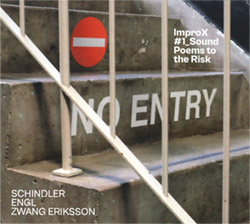

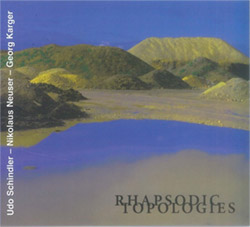

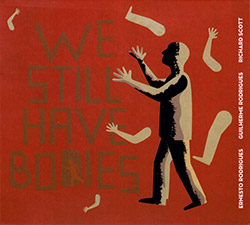
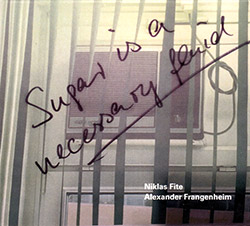

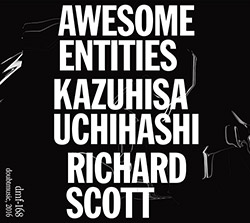
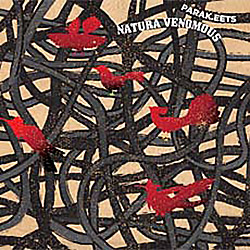
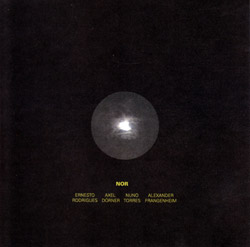
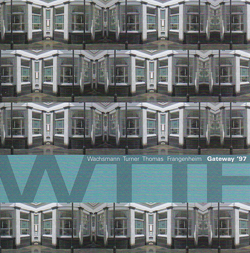
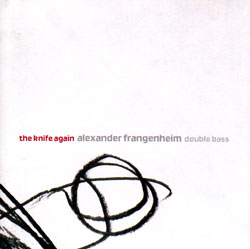
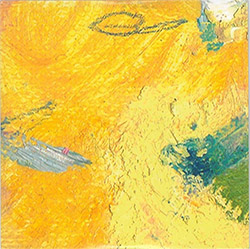
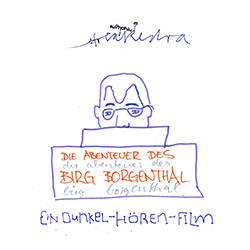
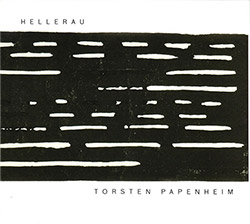
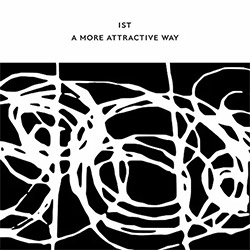
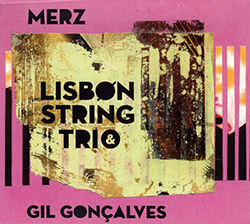
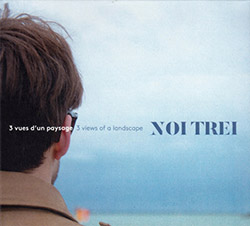


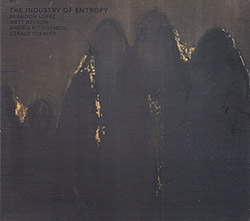







![Guy, Barry / Ken Vandermark: Occasional Poems [2 CDs]](https://www.teuthida.com/productImages/misc4/34849.jpg)
![Novoa / Carter / Mela Trio: Vol.1 [VINYL]](https://www.teuthida.com/productImages/misc4/35236.jpg)


![Elephant9 : Mythical River [VINYL]](https://www.teuthida.com/productImages/misc4/34624.jpg)
![Evans, Peter (Evans / Eldh / Black): Extra [VINYL]](https://www.teuthida.com/productImages/misc4/35279.jpg)

![McPhee, Joe: Straight Up, Without Wings [BOOK]](https://www.teuthida.com/productImages/misc4/35454.jpg)
![Jeck, Philip: rpm [2 CDs]](https://www.teuthida.com/productImages/misc4/35455.jpg)













![Barker / Parker / Irabagon: Bakunawa [VINYL]](https://www.teuthida.com/productImages/misc4/35533.jpg)
![Blaser, Samuel / Marc Ducret / Peter Bruun: Dark Was The Night, Cold Was The Ground [VINYL 10-inch]](https://www.teuthida.com/productImages/misc4/35492.jpg)








![Warren, Kenny (Warren / Hoffman / Ellman): Sweet World [VINYL]](https://www.teuthida.com/productImages/misc4/35451.jpg)




![Blake, Ran / Dave Knife Fabris: Live Amsterdam 2006, First Visit [CD + POSTCARDS]](https://www.teuthida.com/productImages/misc4/35275.jpg)













![DNS: Taking Big Bites Of The Khandas Three Cafes Deep [2 CDs]](https://www.teuthida.com/productImages/misc4/35334.jpg)




![Cleaver, Gerald: The Process [VINYL]](https://www.teuthida.com/productImages/misc4/34966.jpg)




![Alva Noto: HYbr:ID II [VINYL 2 LPs]](https://www.teuthida.com/productImages/misc4/35201.jpg)

![Baron, Derek / Luke Martin: Distinct and Concealed [CASSETTE + DOWNLOAD]](https://www.teuthida.com/productImages/misc4/35079.jpg)

![Lyle, Erica Dawn : Colonial Motels [CASSETTE + DOWNLOAD]](https://www.teuthida.com/productImages/misc4/35080.jpg)









![Sanna, Claudio: Compositori Sardi Contemporanei II [2 CDs]](https://www.teuthida.com/productImages/misc4/35317.jpg)







![Zurria, Manuel: Fame di Vento [3 CDs]](https://www.teuthida.com/productImages/misc4/35167.jpg)

![Granberg, Magnus / Nattens Inbrott / Skogen: Holde Traume, Kehret Wieder! [2 CDs]](https://www.teuthida.com/productImages/misc4/35038.jpg)
![Frey, Jurg: Outermost Melodie [2 CDs]](https://www.teuthida.com/productImages/misc4/35039.jpg)

![Pavone, Jessica: Reverse Bloom [VINYL]](https://www.teuthida.com/productImages/misc4/34895.jpg)




![Modney (Modney / Wooley / Gentile / Roberts / Pluta / Symthe / ...): Ascending Primes [2 CDs]](https://www.teuthida.com/productImages/misc4/34852.jpg)









![Elephant9 with Terje Rypdal: Catching Fire [VINYL 2 LPs]](https://www.teuthida.com/productImages/misc4/35355.jpg)
![Deerlady (Obomsawin, Mali / Magdalena Abrego): Greatest Hits [VINYL]](https://www.teuthida.com/productImages/misc4/34876.jpg)




![Haino, Keiji: Black Blues [2 CDs]](https://www.teuthida.com/productImages/misc4/35109.jpg)



![Surplus 1980: Illusion of Consistency [CD]](https://www.teuthida.com/productImages/misc4/35069.jpg)
![Staiano, Moe: Away Towards the Light [VINYL + DOWNLOAD]](https://www.teuthida.com/productImages/misc4/35037.jpg)



![Caveira (Gomes / Sousa / Abras / Ferrandini): Ficar Vivo [VINYL]](https://www.teuthida.com/productImages/misc4/34643.jpg)
![Gregg, J. J. / David Van Auken: Lunar Prairie [CD w/ DOWNLOAD]](https://www.teuthida.com/productImages/misc4/34611.jpg)

![Coultrain: Mundus [VINYL]](https://www.teuthida.com/productImages/misc4/32439.jpg)
![Mattin: Songbook #6 [VINYL]](https://www.teuthida.com/productImages/misc4/27317.jpg)
![Punkappella: Wake Up [7-inch VINYL]](https://www.teuthida.com/productImages/misc4/17519.jpg)
![Residents, The: WARNING: UNiNC.: Live And Experimental Recordings 1971-1972 [VINYL 2 LPs]](https://www.teuthida.com/productImages/misc4/31521.jpg)
![Coultrain: Phantasmagoria [VINYL]](https://www.teuthida.com/productImages/misc4/30142.jpg)
![Lennon, Sean Ono: Asterisms [VINYL]](https://www.teuthida.com/productImages/misc4/34517.jpg)

![Coley, Byron: Dating Tips for Touring Bands [VINYL]](https://www.teuthida.com/productImages/misc4/17906.jpg)

![Lost Kisses: My Life is Sad & Funny [DVD]](https://www.teuthida.com/productImages/misc4/lostKissesDVD.jpg)